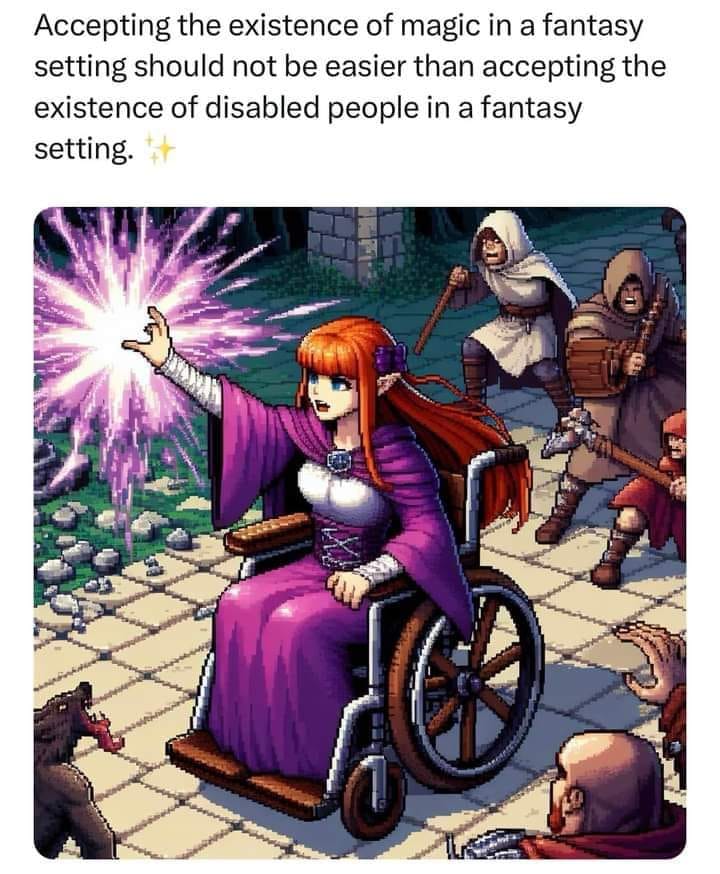Couldn't a cleric heal partial paralysis tho?
RPGMemes
Humor, jokes, memes about TTRPGs
In addition to the list of explanations for why disabled people can exist in a fantasy setting that chumbalumber@lemmy.blahaj.zone provided, I'll also just say:
Using diegetic explanations for why a problematic aspect exists in a piece of fictional media does not address the substance of the problem. The problem is that disability is often not represented in fantasy stories. Pointing out that there's an in-universe explanation for why this may be the case doesn't solve the lack of representation. These stories are fiction, and you can add any explanation for why disabled people exist as easily as you can erase disability completely.
This video does a good job of explaining this some more: https://youtu.be/AxV8gAGmbtk?si=YRvXjpZv_YP9Z5sC
I think the real problem is that magic in D&D is so mundane that any problem can be "magicked away", be it healing a wound, curing diseases or exploding an enemy. That makes some situations only really plausible when it's explained as some stronger magic or "weird power" interfering with common magic.
It's a magical fantasy setting, I get it, but magic being so common and consequence free makes it a deus ex of whatever flimsy explanation you can imagine. "Why do disabled people exist in typical D&D?" Cue that meme of the cartoon's Dungeon Master "It's magic, I ain't gotta explain shit".
The thing I find difficult about disability in a TTRPG is that it's something that is either ignorable due to the character backstory (e.g. they have some mcguffin/ability that allows them to operate without difficulty); or it's going to be a repetitive complication that the party has to constantly work around (e.g. the barbarian carries the wheelchair up every set of stairs they encounter).
If it's just flavour, then it seems like less of a disability than a backstory. If it's a constant hassle, then it changes the nature of the game - it becomes more about a party helping each other through individual adversities. The latter sounds fine, but I'm not sure how I'd run it.
I feel like a lot of the time the best way to handle it would be similar to how the character of Toph is presented in the show Avatar: The Last Airbender. She's blind, but has incredibly good seismic sense through her feet. So most of the time, she can "see" just fine. However, it's still a disability, and there are times where it comes up.
If her feet are injured she can't use them to see. If she's on sand her "vision" will be very blurry and imprecise. If she's flying she becomes completely blind. And she can't read anything written on paper.
The disability is a part of her identity, and it absolutely still matters. But it's not so heavily crippling that it's coming up all the time at the table.
I've always wanted to have a DND character that's an armless monk and all they do is kick bad guys to death.
Why would they complain when they could just have the party's healer offer to heal the NPC in exchange for something? That'd be especially great if they were a merchant.
I really don't understand what's wrong with people not "curing all illness and disability with magic™" in a world where magic exists and is a thing.
See, in most such fantasy settings, magic not only exists but it has an attitude. Sometimes, a conscience, and not a very ethically nice one (if it allows for eg.: necromancy!). Sometimes, magic even is a god (or gods). Even if they aren't, the people who use magic are still ultimately humans (with leafy ears etc but still ultimately humans with costumes, at worst) driven by greed, envy or a weird righteous idea of how should a woman dress and behave when in public.
Would you trust some rando nutjob, who claims to speak for Evelok the Eternal Coffee Mug of Satisfaction, to up and magically conjure you new eyes, new arms, whatever? To alter your body to such a fundamental level? Normal people in such settings are already afraid to death of werewolves and those are quite normal things. Compare: even in our magicless, relatively normal world, we have the power and the money to cure most illness and to treat disabled people adequately yet Obamacare is not universal and we can not trust that the people who give people implants and prosthetics haven't backdoored them to force those disabled people into corporate servitude.
Your player party may be the goodest bois, but they're only one. The various guilds and churches around quite likely aren't such goodies on aggregate either, or else there would simply be no plot.
There are deaf people in the real world with treatable deafness that opt not to because they don't view their deafness as a disability. In addition, not all neurodivergent folks view their conditions as disabilities and wouldn't change even if there was a "cure" for it.
So, I don't see how disabilities in a fantasy setting would be different. It's not even necessarily about trusting the cure, many times it's about how folks view the condition and themselves.
In Pathfinder there is a whole subset of assistive items so that all gamers can feel welcome at the table.
Reminds me of my favourite Flamethrower  Source Tyrant of tower defence game
Source Tyrant of tower defence game
I don't doubt their existence but the wheel chair doesn't look like fantasy.
Depending on the magic it might not make sense because people could heal everything, although you could explain it away by saying that the character could not afford a skilled healer.
I looked it up and the first known wheelchair that you could move yourself in was invented in the 1600s, which was after firearms became relatively common.
